FCC blocks ViaSat's end run around rural experiment standards
![See page for author [Public domain], via Wikimedia Commons](https://www.tellusventure.com/blog/images/2014/12/end_run.jpg)
You’ve got to hand it to the people at ViaSat. They don’t give up. If FCC tests – correctly – show that satellite Internet service has both advantages and disadvantages, then shout the good news loud enough to shake the rafters and browbeat the FCC into suppressing the bad. If the FCC wants to conduct an experiment to see if there are technologies and business models that can deliver urban-quality broadband service to rural customers, try to duck the quality requirements when no one is looking.… More




![By Baran Ivo (Own work) [Public domain], via Wikimedia Commons](https://www.tellusventure.com/blog/images/2014/11/wire_cutter.jpg)
![By Szczebrzeszynski (Own work (Self-made photograph)) [Public domain], via Wikimedia Commons](https://www.tellusventure.com/blog/images/2014/11/marriott_antennae.jpg)



![By Stoat_and_weasel.jpg: Jasja Dekker derivative work: Kürschner (Stoat_and_weasel.jpg) [CC-BY-2.0 (https://creativecommons.org/licenses/by/2.0)], via Wikimedia Commons](https://www.tellusventure.com/blog/images/2014/11/weasel_pelts.jpg)